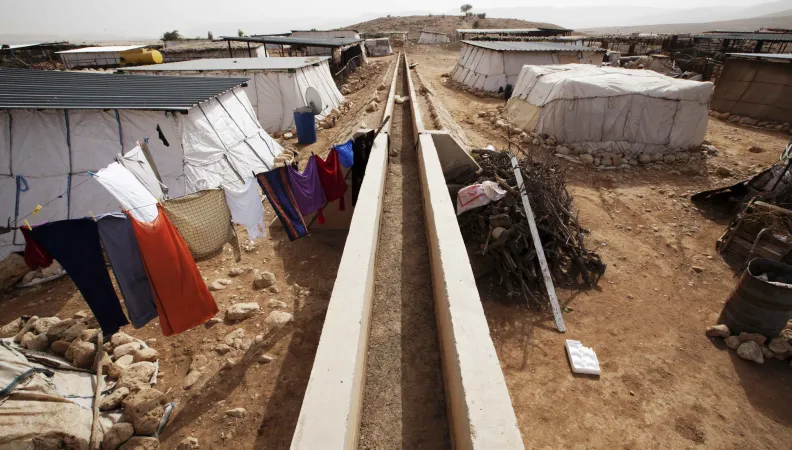Share the page
Capitalization to improve AFD interventions in Area C

-
Project start date
-
2012Status
Completed
-
Project end date
-
2013
-
Project duration
-
9 months
-
Country and region
-
Location
-
Zone C des Territoires palestiniens
-
Research program
The aim of this work was to help guide AFD’s strategic reflection on its intervention in Area C of the Palestinian territories and, more particularly, on how it could help strengthen the resilience of the people who live there.
Context
Area C in the West Bank is a territory rich in natural resources and with a strong potential for economic development. It is also the only part of the West Bank for which the Palestinian National Authority has neither administrative control nor a mandate for conducting security matters, which remain Israeli responsibility. The difficult living conditions there are a threat for the preservation of resources and of lifestyles and especially for the presence of Palestinian communities on this territory. Since 1998, AFD’s intervention has been part of French cooperation’s support system for setting up the foundations of a future Palestinian State. Within this framework, AFD is providing support for the structuring of the Palestinian National Authority. In recent years, the Palestinian National Authority and the international stakeholders have been paying increasing attention to Area C, which is judged essential for ensuring the sustainability of a two-state solution.
Goal
This exercise in capitalization sought to answer two questions: What are the priority needs to target in order to support local development? What forms of intervention should be adopted ?
Method
This study was carried out by a team of students of the Master of Public Affairs program of the Paris Institute of Political Studies (Institut d'études politiques de Paris, commonly known as Sciences Po), within the framework of its partnership with AFD. The capitalization work was based on review and analysis of the lessons learned from five evaluations of projects and studies managed by the AFD Jerusalem agency. It was further rounded out by a broad supplementary review of literature on the subject, interviews with the other parties working in Area C, and field missions whose aim was to conduct exchanges on possible intervention strategies.
Results
The capitalization work shows that existing mapping of needs in Area C is often limited and incomplete, due on the one hand to the extensive fragmentation of the territory and to the great differences in needs from one community to the next, and on the other to the methodologies used and the reasoning of the actors on the ground. The capitalization work also highlights the fact that the aid actors take into account people’s needs to design their interventions, but that they also take into account—and often to an even greater extent—the constraints related to the implementation of the operations under consideration. Finally, the results identify four major types of existing approaches (competition, community, regrouping, and planning) in order to give structure to development assistance in Area C, and they indicate that the donors do not have common approaches.
Lessons learned
The capitalization work suggests that AFD should focus its intervention on the villages that are furthest from the urban centers and that are under the greatest threat by Israeli closures. It further suggests that, within these areas, AFD should identify its priorities by examining the highest levels of vulnerability observed and then comparing them to the reasonable degree of risk that can be made by AFD. Regarding the forms of intervention, the capitalization work recommends combining the existing approaches. More specifically, it is the community and regrouping approaches that should be furthered, in order to enable both a detailed and efficient taking into account of the specific needs of the communities present there, and an intervention that is coherent from a territorial point of view. Intervention that takes into account the zoning of infrastructure needs approved by the Israeli authorities would make it possible to situate the intervention within a framework recognized by these authorities and to thereby minimize the risks at time of implementation (in terms of political issues, deadlines, and coordination of actors).
Contact : Karen Rousseau, evaluation officer (rousseauk@afd.fr)
